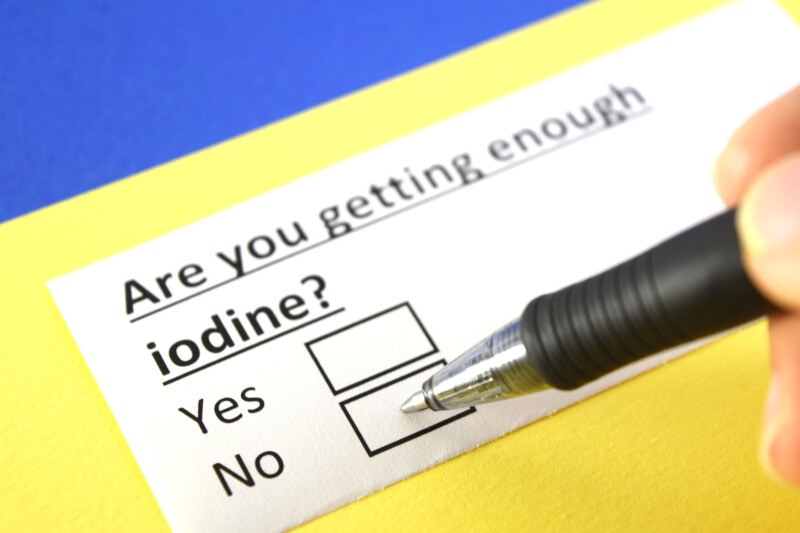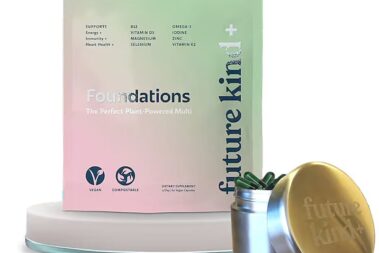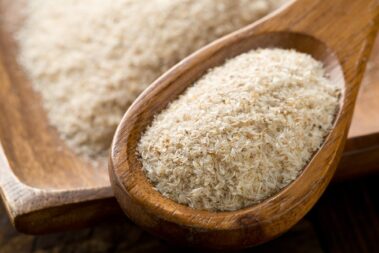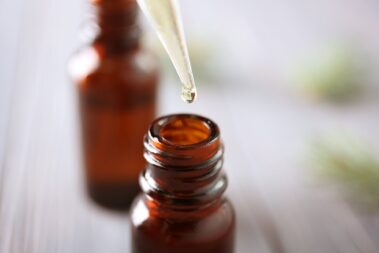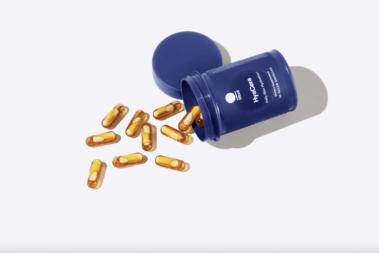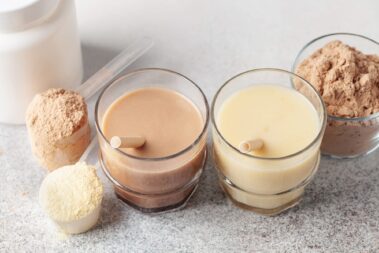A well-planned plant-based diet can provide the majority of nutrients you need, but there are a few that may require a little more attention, such as iodine. Here’s what you need to know about getting enough iodine on a plant-based diet, plus supplements to consider.
Table of Contents
What is Iodine?
Iodine is a trace mineral that plays a main role in thyroid health and function. It may also have some involvement in your immune system.
Iodine and Thyroid Health
Your thyroid is a butterfly-shaped gland that sits at the base of your neck. It’s involved in growth and metabolism, as well as digestion, heart rate, and sense of temperature.
Iodine is the main component of the two hormones produced by the thyroid, thyroxine (T4) and triiodothyronine (T3). These are required for enzymatic and metabolic processes, including making proteins and supporting skeletal and nervous system development.
The function of your thyroid is largely regulated by thyroid-stimulating hormone (TSH), secreted by the pituitary gland. The secretion of TSH boosts iodine uptake, which triggers the release of T3 and T4.
When you don’t have enough iodine, TSH levels remain high. Eventually, this can lead to an enlarged thyroid gland, called a goiter, in an attempt to trap more iodine from your bloodstream and keep the thyroid working properly.
In fact, goiter is the most prominent symptom of iodine deficiency, often accompanied by hypothyroidism (under-functioning thyroid). On the other hand, too much iodine is also problematic and can lead to hyperthyroidism (over-functioning thyroid). That’s why it’s important to know where, and how much, iodine is in your diet.
Iodine in the Diet
Iodine is naturally present in the soil, and some of it is transferred to fruits, vegetables, legumes, and grains grown in that soil. However, its presence has been altered over time as a result of agriculture and other human activities. As such, there are areas in which soil is largely iodine-deficient.
Because of the inconsistency in iodine intake around the world, salt iodization programs have been implemented in many countries, including the United States. Today, iodized salt is the most widely accessible and utilized source of dietary iodine.
In addition to iodized salt, iodine is found in animal-derived foods like fish and eggs. It’s also present in dairy products, but this is because cows are supplemented and amounts can vary depending on sanitation practices used in this setting.
Vegan & Vegetarian Food Sources of Iodine
The main plant-based source of iodine is seaweed, like kelp, nori, dulse, kombu, and wakame. However, seaweed can be an inconsistent source – and even contribute too much iodine if you consume it often. Check out our own Kirsten for a simple seaweed salad recipe you may like.
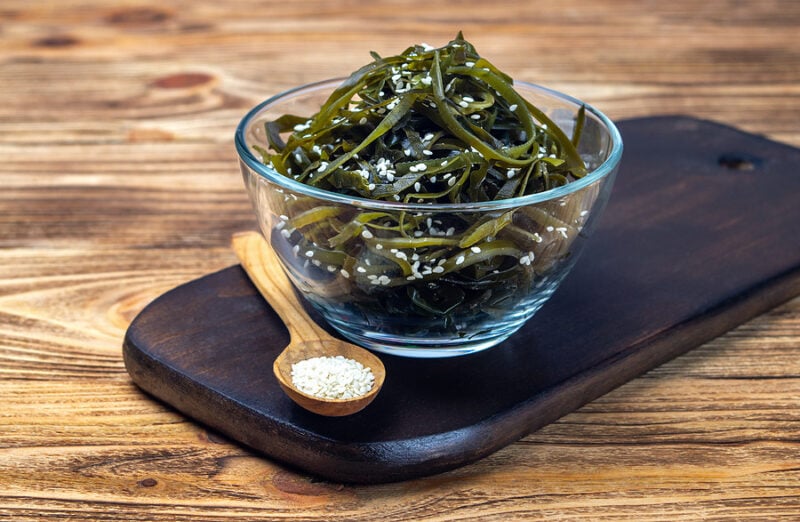
Overall, if you don’t consume iodized salt, animal products, or seaweed, you may not be getting much iodine in your diet.
Plant-Based Foods & Goitrogens
Flax seeds, soy, and raw cruciferous vegetables (such as broccoli, Brussels sprouts, bok choy, cabbage, and kale) contain compounds called goitrogens, which may impair iodine absorption from other foods and put you at a higher risk for deficiency.
While there are attention-grabbing headlines about this online, there’s no evidence that goitrogenic foods are a major risk for most people, including vegans. The risk increases for people with existing iodine deficiency who eat abnormally large amounts of goitrogens. For instance, those who live in areas with iodine-deficient soil and eat a diet based on foods like cassava root.
If you can’t identify iodine sources in your diet, you may want to consider taking it in supplemental form. We’ve compiled several iodine supplements below that may fit well on a plant-based diet.
What to Look for in an Iodine Supplement
When looking for a vegan iodine supplement, consider the following:
- The majority of iodine supplements are vegan. However, check the ingredient list to make sure it doesn’t contain animal-derived ingredients, such as gelatin.
- Some may contain other nutrients, like calcium or potassium. This may not be a good choice if you’re taking other supplements that contain these nutrients, due to the risk of getting too much from multiple supplemental sources.
- Many iodine supplements contain substantially more than the recommended dietary allowance, which is 150 mcg for adults. If you’re pregnant, needs increase to 220 mcg, and to 290 mcg per day during lactation. Just as not getting enough iodine can be problematic, so can getting too much. It’s generally best to choose one that does not exceed this standard amount unless otherwise directed by your doctor.
Before adding these or any other supplements to your routine, consult with a qualified healthcare provider to make sure the one you choose is the right fit and there are no potential health or medication interactions.
Iodine in Multivitamins
If you take a multivitamin with minerals, iodine is included in most standard formulations in the dose of 150 mcg or 100% of your daily needs.
Unless directed by your physician, it’s not recommended to take an additional iodine supplement in this case. Check the nutrition panel to confirm whether yours contains iodine and how much is included per serving.
The Best Vegan Iodine Supplements
If you’ve found yourself in the market for an iodine supplement, here are some that may be worth considering to support a plant-based lifestyle.
1. FutureKind Vegan Iodine Supplement
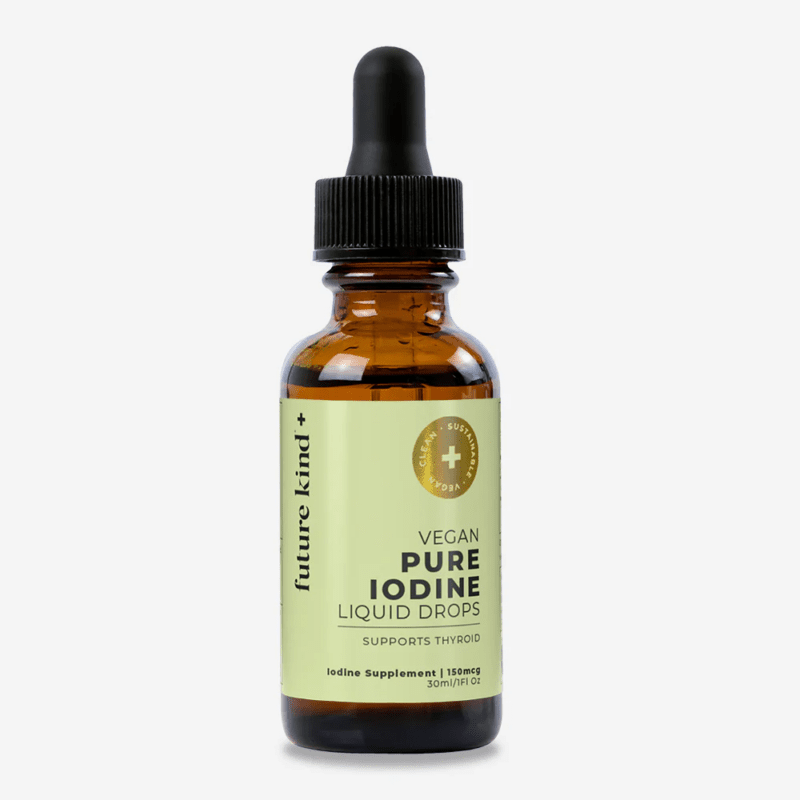
This is a liquid dropper form of deep-earth sourced potassium iodine. You’ll get 150 mcg of iodine in the daily serving, which is 10 drops. Per the instructions, you use this by dropping it into water or juice, though some consumers note dropping it under their tongue in their reviews.
No alcohol or gas solvents are used in the production of this supplement, opting instead for water and plant-derived glycerin. It’s also free from artificial colors, flavors, preservatives, added sugar, and salt.
You get 60 servings per container, which is priced between $19-21 per bottle depending on how many you purchase at once. While it doesn’t bear an official third-party testing seal, the brand does state that it carries out independent testing on every batch.
This brand also uses 100% sustainable, recyclable materials and donates some of its processed to vegan animal sanctuaries.
2. MaryRuth’s Organics Nascent Iodine Liquid Drops

This is a liquid potassium iodide supplement.
Note that 2 drops contain 250 mcg of iodine, which exceeds the standard daily dose of 150 mcg for non-pregnant women, but only meets 86% of the daily needs for pregnant women. As such, the product states that its daily recommended dosage is 1-2 drops per day, depending on your individual needs that should be discussed with your doctor.
There are 450 servings per container, priced at $18-20 each depending on whether you sign up for their subscription program.
This product is certified USDA Organic, and free from artificial colors and added sugar. You can take it directly by mouth or drop it into juice or water before drinking. According to the product website, it tastes like slightly sweetened water.
3. Peak Performance Raw Whole Food Iodine

This is an iodine capsule, which is sourced from raw organic kelp.
Directions are to take one capsule per day, which provides 150 mcg of iodine. One bottle contains 60 capsules and is priced at $20.
While they don’t bear official certification seals, the brand states that this product is third-party tested, organic, and non-GMO, as well as free from artificial colors and additives.
Additionally, this brand partners with Vitamin Angels. This means that for every product purchased, they will supply one child at risk for malnutrition with vitamins for a year.
4. Benevolent Nourishment Liquid Iodine

This is a liquid potassium iodide supplement, which provides 150 mcg of iodine per drop.
Each bottle contains 1300 servings and is priced at $18. You can add the drops to water or juice before consuming, or place them directly onto your tongue.
According to consumer reviews, this product has a pleasant flavor and is easy to use.
5. Pure Encapsulations Iodine

This is a potassium iodide supplement that comes in capsule form. Each capsule provides 225 mcg of iodine or 150% of the daily value, which may be more appropriately used by pregnant women or if otherwise directed by your doctor.
Each bottle is priced at $16 and contains 120 capsules.
This supplement is free from artificial colors, flavors, sweeteners, and preservatives.
This brand is well-known and respected in the dietary supplements industry. The brand notes that they use high-quality ingredients and that all raw materials and finished products undergo third-party testing for purity and potency.
6. Thorne Research Iodine & Tyrosine

This is a potassium iodide supplement that also provides 225 mcg of iodine per capsule. Each bottle contains 60 capsules and is priced at $18.
Each capsule also contains 500 mg of L-Tyrosine, an essential amino acid that is used by your body to make thyroid hormones.
Thorne Research is a respected dietary supplements brand. It manufactures its supplements in facilities that are GMP-certified by NSF International.
7. NOW Kelp Natural Iodine

This is a tablet iodine supplement derived from kelp. It’s free from artificial colors, flavors, sweeteners, and preservatives.
Each tablet provides150 mcg of iodine, and there are 200 tablets per bottle, which are priced at $9.
The NOW brand has been around since 1968 and is a founding partner of Vitamin Angels, which means they support and donate products to children at risk for malnutrition around the world.
Iodine FAQ
The RDA for iodine is 150 mcg per day for average healthy adults aged 14 and older. Daily needs increase to 220 mcg during pregnancy and 290 mcg during lactation. While some people may be able to meet daily needs through food, others may need an iodine-containing supplement to do so.
The most prominent clinical symptom of iodine deficiency is the development of a goiter or an enlarged thyroid gland. Other potential symptoms can include “brain fog”, fatigue, apathy, unintentional weight gain, constipation, temperature sensitivity, and hair loss. For pregnant women, severe iodine deficiency can cause growth and neurodevelopmental deficits in fetuses.
While dairy milk contains some iodine, plant-based milks (such as soy and almond milk) contain relatively small amounts and should not be relied upon as a primary source of iodine.
Fruits and vegetables only contain as much iodine as is transferred from the soil in which they’re grown, which is largely inconsistent. More reliable food sources of iodine on a vegan diet include iodized salt and seaweed. If these items are not a regular part of the diet, vegans may benefit most from an iodine-containing supplement.
Pregnant and breastfeeding women, vegan or not, have increased iodine needs and may therefore be at higher risk for not getting enough. Additionally, those living in areas with iodine-deficient soil and who don’t consume iodized salt or other food sources of iodine may be at higher risk.

